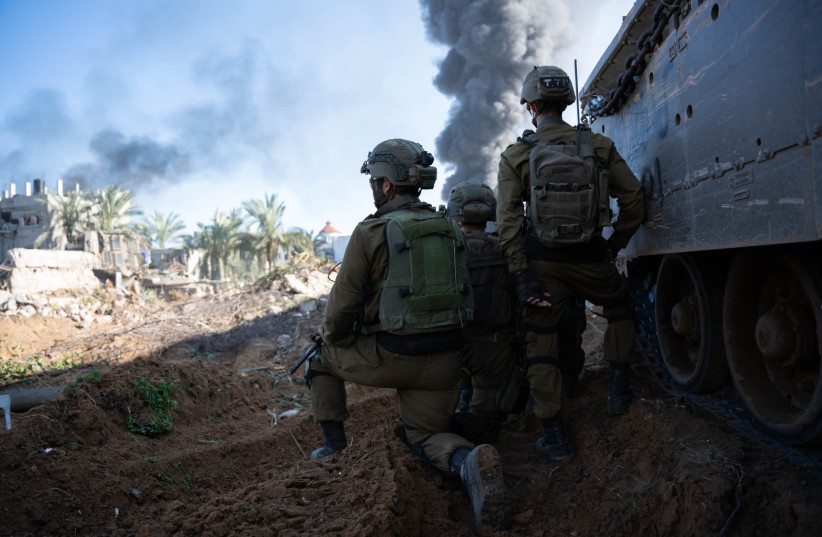In Ethics of Our Fighters, Rabbi Shlomo Brody has produced a deeply considered analysis, based upon a profound understanding of the principles underlying Judaism and Jewish thought, regarding the ethical dilemmas posed by the sometimes unavoidable need to engage in warfare. Never was the title of a book more apt or more descriptive of its contents.
Its conclusions, however, are far from confined to people engaged in defending Israel or the Jewish people. Like so much of the civilized world’s view of morality, emanating as it does from the Torah and associated Jewish thinking, they are universally applicable.
Rabbi Brody, a graduate of Harvard College, received his rabbinic ordination from the Israeli Chief Rabbinate, his MA in Jewish philosophy from Hebrew University, and his doctorate in law from Bar-Ilan University. His writings on Jewish ethics and contemporary moral dilemmas have been published in numerous journals and cited by the Israeli Supreme Court. His first book, A Guide to the Complex: Contemporary Halakhic Debates (Maggid), received a 2014 National Jewish Book Award.
The title of his current book, Ethics of Our Fighters, is an adaptation of “Ethics of the Fathers,” the English title of Pirkei Avot, the famous collection of ethical principles uttered by the leading rabbis whose legal and related opinions appear in the Talmud. Pirkei Avot’s six chapters of ethical and moral pronouncements are included in the daily prayer book. Replete with the wisest of wise counsel as they are, Brody points out that Pirkei Avot has nonetheless nothing at all to say about the ethics of warfare or the moral and ethical principles that should be followed in times of conflict.
The reason is not difficult to deduce. For centuries after the Roman era, the scattered Jewish people simply did not engage in military matters. The long lacuna came to an end just over 100 years ago, when Jews were caught up in World War I and fought on both sides, according to the countries in which they lived. Then, starting in the 1920s, in their ancient homeland of Israel, known then as British Mandate Palestine, Jewish fighters found themselves in armed conflict with local Arabs who were intent on preventing the League of Nations mandated establishment of a “national home for the Jewish people.”

Jewish involvement in World War II was based on David Ben-Gurion’s decision to put aside temporarily the Jewish Agency’s long-running dispute with Britain over its restricted Jewish immigration quota and to engage wholeheartedly in the Allied war effort. In the event, some 30,000 Jews living in Palestine served in the British army, while over 1.5 million Jews fought the Nazis in various national armies.
Many Jews saw World War II as an opportunity to overcome antisemitic prejudices that condemned Jews as either weak or unpatriotic.
In the Tachanun prayer, recited on most Mondays and Thursdays, Jews for centuries had lamented “Look down from heaven and see how we have become an object of scorn and derision among the nations. We are regarded as sheep led to the slaughter, to be killed, destroyed, beaten, and humiliated.”
Military service restored Jewish honor.
After the war, UK chief rabbi Israel Brodie said that Jewish soldiers had “shown to the world that, given the opportunity, the Jew as a soldier is the equal of any other man.... [They] enhanced the Jewish name and reputation for gallantry and devotion to duty.”
Following WWII, the Jewish armed struggle encompassed the British army itself; and finally, in 1948, Israel’s armed forces faced the first of the pan-Arab attempts to extinguish the newly formed State of Israel on part of the Jewish people’s indigenous land.
The Jewish reaction to the moral challenges of warfare
Ethics of Our Fighters has as its background the Jewish reaction to being confronted with the moral challenges of warfare. Brody tackles the ethics of going to war at all, the moral dilemmas that arise with preemptive strikes and preventative military action, and with the issues that arise in fighting, including the vexing question of proportionality and the justification for collateral deaths and damage.
Brody draws a vital distinction between the definition of proportionality in international law and the political implications of applying the principle. People, he writes, have lost the sense of why unintended, but inevitable, deaths in warfare are morally justified. He offers a striking example from 2003 – an episode he describes as “Sharon’s horrific mistake.”
In September of that year, then-Hamas leader Ahmed Yassin gathered with all his senior men in a three-story Gaza apartment building. Israel’s Intelligence officials, led by Shin Bet head Avi Dichter, declared this a historic opportunity. Bombing the building could have eliminated the head of Hamas and all its leaders in one strike. The terrorist group could have suffered irreparable damage. However, Israel didn’t strike. Having recently been condemned by international opinion for lack of proportionality in an earlier strike, prime minister Ariel Sharon, fearful of the political backlash, called off bombing the building. (He is also the leader who had Jews forcibly removed from their homes in Gaza in order to hand over the beautiful, fruitful, and peaceful settlements to the Palestinian Authority, which was immediately ousted by Hamas.) The rest, as they say, is history.
Ethics of our Fighters is truly a book for our times.
- ETHICS OF OUR FIGHTERS
- By Rabbi Shlomo M. Brody
- Koren Publishers
- 412 pages; $33
